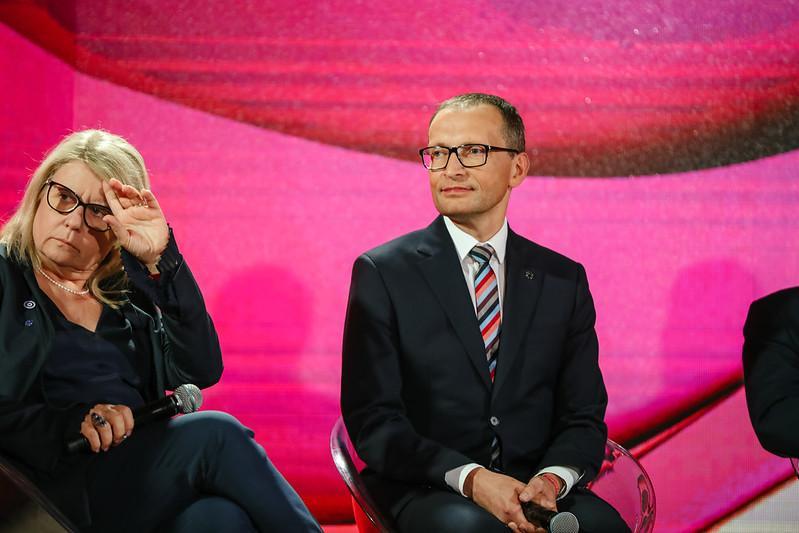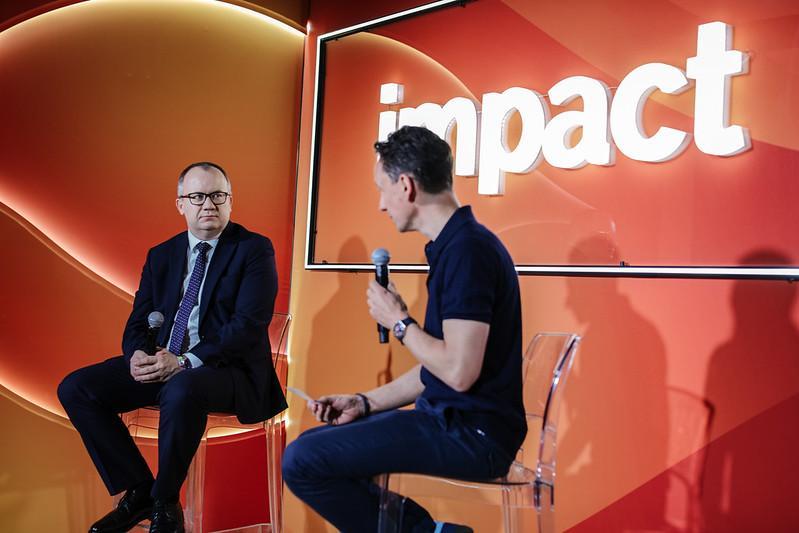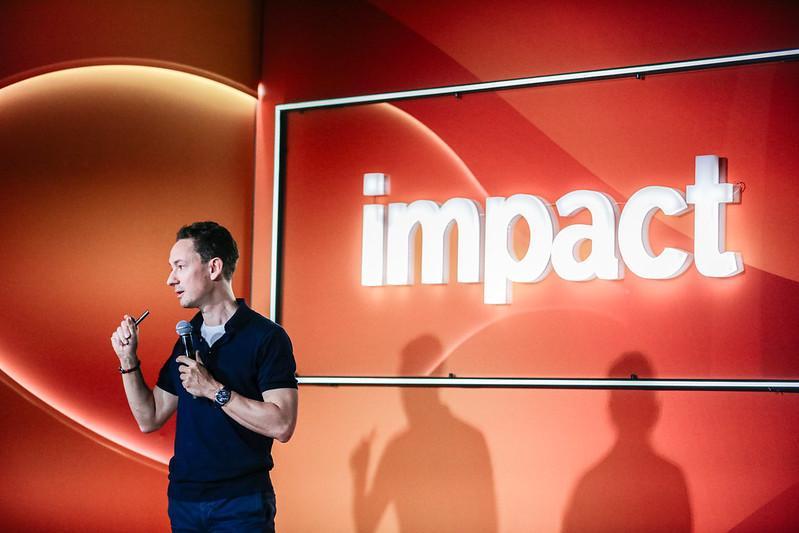Modern state puts the citizen at its core
Impact'24 featured 650 distinguished speakers who shared their expertise across 23 thematic tracks. The Modern State track, organized by SWPS University, focused on creating a state that benefits society and enhances public action efficiency. Experts from our university and esteemed guests discussed education, the social mission of universities, mental health policies, and the rule of law.
The track was inaugurated by Mark Brzeziński, the US Ambassador to Poland. He highlighted the crucial role of collaboration between universities and businesses in driving economic growth and societal well-being. Ambassador Brzeziński showcased examples from American research centers and companies, illustrating how investing in education and innovation can significantly benefit various fields, from health and medicine to national and food security.
The future of education in Poland
The panel discussion "Education as Public Policy: Schools" emphasized the role of education in empowering citizens to actively participate in a democratic society. It was moderated by Karolina Słowik from Gazeta Wyborcza daily and featured Joanna Mucha, Deputy Minister of National Education; Professor Paula Pustułka of SWPS University; Wiktor Zieliński, a "Talenty" scholarship fund recipient; and Professor Wojciech Woźniak, author of a book on Finnish public policies.
The discussion highlighted the importance of:
- rebuilding trust in schools as institutions where children can acquire knowledge, skills, and competencies
- ensuring that education is inclusive for all
- preparing students for life in a constantly changing environment
- promoting fundamental values and relationship-building in schools
- developing competencies such as empathy, cooperation, and project management
- adapting educational reforms to suit the needs of Polish society, drawing inspiration from successful models developed by other countries
During his individual presentation, Wojciech Woźniak mentioned some aspects of the Finnish education system that are not immediately apparent but contribute to the quality of education. These included the suicide prevention program, the energy transformation model, and the support system for diverse artists, ranging from poets to metal bands. Additionally, Ulla Leinikka from the Central Library Oodi in Helsinki emphasized the benefits of developing modern libraries in her speech.
 Panel discussion on universities. Photo courtesy of Impact CEE
Panel discussion on universities. Photo courtesy of Impact CEE
 Professor Roman Cieślak, rector of SWPS University. Photo courtesy of Impact CEE
Professor Roman Cieślak, rector of SWPS University. Photo courtesy of Impact CEE
 Panel discussion on the future of education feautring Professor Paula Pustułka (second from the right). Photo courtesy of Impact CEE
Panel discussion on the future of education feautring Professor Paula Pustułka (second from the right). Photo courtesy of Impact CEE
The mission of universities is to serve the society
The discussion on universities featured Professor Roman Cieślak, Rector of SWPS University; Professor Maria Mrówczyńska, Deputy Minister of Science and Higher Education; Professor Janusz Uriasz, President of the Polish Accreditation Committee; Professor Bogumiła Kaniewska, Rector of Adam Mickiewicz University; and Kewin Lewicki, Chairman of the Students' Parliament of the Republic of Poland.
The debaters highlighted the need for:
- high-quality education and research, along with cooperation between universities and their socio-economic environment
- independent evaluation of educational quality
- legal stability of universities and improvement of the financial situation, especially for young scientists
- a comprehensive education plan from schools to universities
- dialogue with students and recognition of their social needs
- increased funding for science and higher education
Strengthening mental health policies
During the "Mental Health as Public Policy" discussion panel, SWPS University was represented by Professor Agnieszka Popiel, co-creator of the School of Cognitive-Behavioral Therapy. She emphasized the value of leveraging the experiences of other countries and insights gained from empirical data on the effectiveness of psychotherapeutic interventions and cost analysis. This is precisely the knowledge that researchers working at universities possess. The findings from their studies can inform the design of necessary reforms.
In his speech, Professor David Clark from the University of Oxford, a renowned expert on anxiety and depressive disorders and an advisor to the British National Health Service, highlighted the substantial social and economic benefits of investing in mental health care and policies. Professor Clark underscored the necessity of integrating scientifically validated intervention methods into mental health systems to achieve these benefits.
Addressing disinformation and polarization
The session on the rule of law and civic attitudes covered various topics, including the collaboration between academics and politicians, migration policy, the Polish legal system, and the spread of disinformation. The speakers included Professor Maciej Kisilowski from the Central European University; Maciej Duszczyk, Undersecretary of State in the Ministry of the Interior and Administration; Zuzanna Rudzińska-Bluszcz, Undersecretary of State in the Ministry of Justice; and Dr. Katarzyna Bąkowicz of SWPS University, an expert in fighting disinformation. The main focus of the discussion was on the importance of collaboration between experts, state institutions, and citizens in order to build a wise and friendly state.
During his speech, Wawrzyniec Smoczyński of SWPS University presented a five-step plan to reduce societal polarization in Poland:
- Respect divisions.
- Reduce prejudices.
- Promote good conversation.
- Focus on common ground.
- Teach effective dialogue.
The Modern State track concluded with an interview with Professor Adam Bodnar, Minister of Justice and former Dean of the Faculty of Law at SWPS, who emphasized the need for judicial reforms in Poland.
 Panel discussion on mental health featuring Professor Agnieszka Popiel (first from the left). Photo courtesy of Impact CEE
Panel discussion on mental health featuring Professor Agnieszka Popiel (first from the left). Photo courtesy of Impact CEE
 Professor Adam Bodnar (on the left) and Wawrzyniec Smoczyński. Photo courtesy of Impact CEE
Professor Adam Bodnar (on the left) and Wawrzyniec Smoczyński. Photo courtesy of Impact CEE
 Wawrzyniec Smoczyński. Photo courtesy of Impact CEE
Wawrzyniec Smoczyński. Photo courtesy of Impact CEE
Preparing for the future
Additionally, representatives of SWPS University participated in discussions during other thematic tracks. They were actively involved in conversations about the future of business and the collaboration between academia and industry as part of the Industry 5.0 track. Our university was represented by Dr. Ewa Ger, Director General; Karolina Wójcik, Head of SWPS Innovations; Dr. Maksymilian Bielecki from the Faculty of Design in Warsaw; and Dr. Konrad Maj from the HumanTech Center for Social and Technological Innovation.
The consensus was clear:
- Modern research and education centers need to develop competencies that align with technological advancements.
- Universities should prioritize solutions that address current societal needs.
- Businesses need to prioritize the well-being of the employees, as it can be crucial for their involvement in the operation and development of the organization.
Furthermore, SWPS Innovations presented a report focusing on transforming organizations to be future-proof. The report offers insights on how Polish companies can leverage contemporary challenges to gain sustainable competitive advantages.
Creating space for crucial conversations
The Future Societies track featured a presentation by Dr. Joanna Jurga on how a neurodivergent perspective can aid in designing our private and public spaces. In the Mental Health & Wellbeing track, Dr. Katarzyna Grunt-Mejer from the Faculty of Psychology and Law in Poznań discussed the potential benefits of using hallucinogens to treat certain mental health conditions, supported by growing research.
As a part of the Design Manifesto track, Kinga Nowacka, Director of Marketing and Admissions and Deputy Director General of SWPS University, recognized as one of Poland's top marketing managers, delivered a lecture on embracing ignorance in business to foster competitiveness and innovation.
Addressing today's challenges
The Impact congress, held annually in collaboration with numerous private, public, and media partners, is the premier event in Central and Eastern Europe that accurately reflects current regional discussions and global trends. It provides a comprehensive understanding of the context in which we all operate, especially in an era marked by global conflicts and challenges. This year marks the second time SWPS University has served as a content partner of the event. We had the privilege of presenting our perspectives on developing public policies in education, health, and law, as well as proposing solutions for civil society.